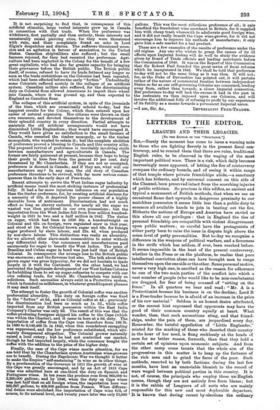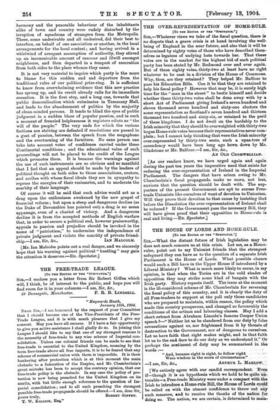LETTERS TO THE EDITOR.
[To THE EDITOB Of THE " SPECTATOR.1
SIR,—Surely the moment has come to issue a warning note to those who are fighting fiercely in the present fiscal con. troversy, and to remind them that there are rules, traditional English rules, to be observed in the waging of the most important political wars. There is a risk, which daily becomes increasingly more apparent, of letting the fire of controversy overpass the ordinary bounds, and of seeing it within range of that temple where private friendships abide,—a sanctuary which has hitherto, and by universal consent on this side of the Channel, been preserved intact from the scorching injuries of public criticism. So precious is this edifice, so ancient and typical a monument of British methods, that when we see an occasional flame dart upwards in dangerous proximity to our matchless possession it seems little less than a public duty to summon all available hands to join in beating out the fire. Hitherto the nations of Europe and America have envied us this above all our privileges : that in England the ties of personal friendship are compatible with violent disagreement upon public matters ; so careful have the protagonists of either party been to raise the issue in dispute high above the mean level of petty personalities. But to-day we recognise a difference in the weapons of political warfare, and a fierceness in the strife which has seldom, if ever, been reached before. It seems impossible in the heat of the present controversy, whether in the Press or on the platform, to realise that pure intellectual conviction alone can have brought men to range themselves upon the one side or the other. Some personal motive, never a very high one, is ascribed as the reason for adherence to one of the two main parties of the conflict into which a vast number of people (who would like to be non-combatants) are dragged, for fear of being accused of "sitting on the fence." In all quarters we hear and read : "Mr. A is a Protectionist because his business is on the decline; Lord B is a Free-trader because he is afraid of an increase in the price of his raw material." Seldom is an honest desire attributed, or the merest hint expressed that opponents may have the good of their common country equally at heart. What wonder, then, that such accusations sting, and that friend- ships, under the pain of them, are jeopardised every day. Remember, the hateful appellation of "Little Englander," minted for the marking of those who deserted their country in the hour of her need, is flung recklessly at the heads of men for no better reason, forsooth, than that they hold a certain set of opinions upon economic subjects. And from the other camp come taunts that the whole aim of the progressives in this matter is to heap up the fortunes of the rich men and to grind the faces of the poor. Such methods, resorted to by both factions during the last few months, have lent an unenviable blemish to the record of wars waged between political parties in this country. It is not, of course, the principals who employ these un-English means, though they are not entirely free from blame ; but it is the rabble of Leaguers of all sorts who are mainly responsible for this new and most deplorable departure. It is known that during recent by-elections the ordinary harmony and the peaceable behaviour of the inhabitants alike of town and country were rudely disturbed by the irruption of squadrons of strangers from the Metropolis. These, some undesirable and all undesired, did their best to interfere, on behalf of one association or another, in the local arrangements for the local contest; and having arrived in a whirlwind of arrogant assumption of authority, they stirred up an inconceivable amount of rancour and illwill amongst neighbours, and then departed in a tempest of execration from both sides to the place whence they came.
It is not very material to inquire which party is the more to blame for this sudden and sad departure from the traditional rules of our political prize-ring. It is sufficient to know from overwhelming evidence that this new practice has sprung up, and its result already calls for its immediate cessation. It is the first step, and a long one, towards that public demoralisation which culminates in Tammany Hall, and leads to the abandonment of politics by the majority of clean-minded persons. It tends to blind the eyes of public judgment in a sudden blaze of popular passion, and in such a moment of frenzied helplessness it registers edicts as "the will of the people." The very ends for which the various factions are striving are defeated if resolutions are passed in a gust of passion, between the speech from the megaphone and the overturning of the furniture. No sane person can take into account votes of confidence carried under these Continental conditions ; and the educational value of such proceedings will not be placed to the credit of the League which promotes them. It is because the warnings against the use of such instruments are so obvious and so manifold that I feel that an appeal should be made by the leaders of political thought on both sides to those associations, orators, and scribes with whose fiscal ideals they are in sympathy to repress the energies of their emissaries, and to moderate the acerbity of their language.
Of course it will be said that such advice would act as a drag upon the enthusiasm awakened by the new gospel of financial reform ; but upon a steep and dangerous decline (as the Duke of Devonshire has pointed out) a drag is no mean appanage, even of a chariot of victory. And a dangerous decline it is from the accepted methods of English warfare that, in order to secure a political end, however praiseworthy, appeals to passion and prejudice should be invoked in the name of "patriotism," to undermine the independence of private judgment and violate the sanctity of private friend- [Mr. Ian Malcolm points out a real danger, and we sincerely hope that his warning against political " hustling " may gain the attention it deserves.—ED. Spectator.]







































 Previous page
Previous page